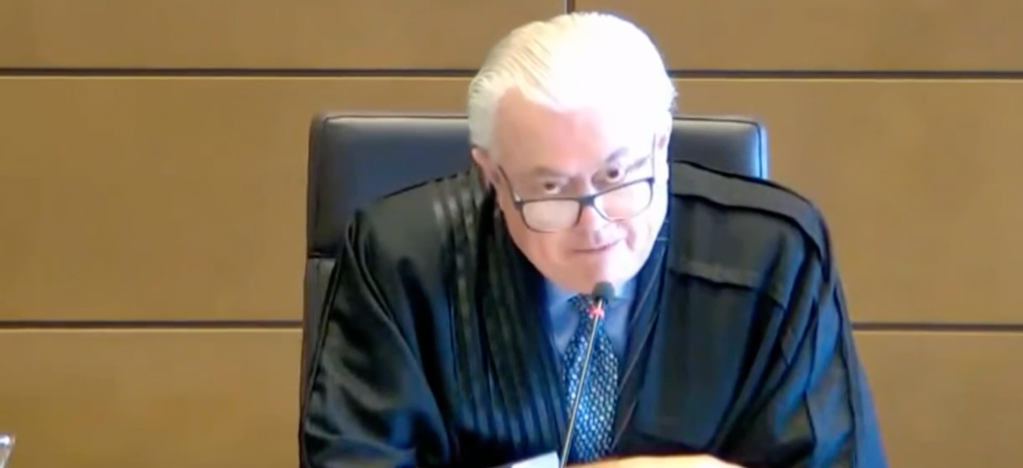
CONTENT WARNING: This article discusses sexual assault.
In a historic defamation case in the Federal Court, Justice Michael Lee decided that on a balance of probabilities, Bruce Lehrmann raped Brittany Higgins in 2019. Yet despite being dubbed a rapist by a judge, Lehrmann freely walked out of the court and is very unlikely to face time behind bars.
Lee’s decision that Lehrmann lost the defamation case he initiated against Network 10 ended with the explosive ruling that Lehrmann had “engaged in a great wrong”, in that he had raped Higgins, and that he was “not entitled to the vindication of his reputation”.
The next day, newspapers across the country were plastered with headlines that called Lehrmann a rapist and a liar — quoting Lee’s judgement. But the rapist and liar was not cuffed, he was not apprehended by police, and he was not given jail time for what the judge said he did to Brittany Higgins.
And as vindicating as it is to be able to call Lehrmann a rapist without giving our legal team (as big) a heart attack, there is a massive element of justice missing for the survivor of the foul act.
So why is it that a man can be called a “rapist” but be allowed to walk free? Why didn’t Bruce Lehrmann go to jail?

Why Bruce Lehrmann didn’t go to jail
It all comes down to the difference between a criminal case and a civil case, what the outcomes of the types of trials are, and the different standards of proof required in them.
Different case outcomes
To have been sent to jail, Lehrmann would need to be found guilty of a criminal offence in a criminal trial. Criminal cases are brought by the state against an accused person. A person accused of a crime is entitled to “the presumption of innocence”, and the state must prove their criminal case “beyond reasonable doubt”, which is the highest legal standard of proof. The case in the Federal Court that he lost on Monday was a civil defamation one, where the judge’s ruling only determines which of the involved parties win the dispute.
A civil case is where one party sues another, usually to recover money. A civil case sometimes deals with issues of contract breach, personal injury, or defamation. They’re often commercial disputes between two people or companies. They often result in the judge awarding one party damages and an order to pay the other party’s legal fees. A civil case can be initiated by anyone, however, a criminal case is almost always initiated and prosecuted by the respective state’s prosecutor. Lehrmann had previously been charged with rape by the ACT’s prosecutor, but that charge was eventually dropped after a juror didn’t follow the rules, resulting in a mistrial.
In the case of Lehrmann v Network 10, the latter was awarded the win and will likely have their legal fees paid by the loser/liar/rapist. These fees will hurt Lehrmann and probably bankrupt him and his reputation is forever ruined as a consequence of his own actions — but he won’t be jailed.
Different standards of proof
Lee ruled that “on a balance of probabilities” Bruce Lehrmann raped Brittany Higgins. This is important because the standard of proof a judge needs to find in a civil case is a very different to a criminal case.
To be guilty of a criminal charge, an accused needs to be found guilty of a crime “beyond reasonable doubt”, which is a lot harder to prove, particularly in cases where the only witnesses are the victim and the accused. Lee explained this in the conclusion of his ruling.
“As I stressed at the commencement of these reasons, there is a substantive difference between the criminal and civil standards of proof. To make the grave finding Mr Lehrmann raped Ms Higgins, it is unnecessary for me to reach a level of certainty indispensable to criminal liability,” he explained.

“As a result of the inconclusive criminal trial, Mr. Lehrmann remains a man who has not been convicted of any criminal offence, but he has now been found, by the civil standard of proof, to have engaged in a great wrong. It follows Ms Higgins has been proven to be a victim of sexual assault.”
This creates the unusual result where Lehrmann has been found to be a “rapist”, despite not being found criminally guilty of said crime, as a judge ruled that he committed a sexual assault in a civil trial.
Appealing the case ruling
One of the similarities that criminal cases and civil cases have is that the decisions can be disputed and appealed in a higher court. Given that Lehrmann v Network 10 took place before a single judge in the Federal Court, his next option would be to appeal to multiple judges of the Federal Court, and if he still isn’t satisfied, the High Court.
Experts such as former NSW Supreme Court judge Anthony Whealy KC believe an appeal from Lehrmann is likely to be made.
“He’s well represented by lawyers, there’s the issue of costs hanging over everybody’s heads … so why wouldn’t they appeal having come this far?” Whealy told the ABC.
While Whealy believes that an appeal will be made by Lehrmann, he reckons the chances it succeeds are slim.
Why was Bruce Lehrmann in a defamation case and not a criminal case?
Short answer: Lehrmann already faced a criminal trial for raping Brittany Higgins.
In 2022 Bruce Lehrmann was put on a criminal trial for the alleged rape of Brittany Higgins in 2019 — a case that if he lost would have found him guilty of one charge of sexual assault and earned him a one-way police van ride to prison. This criminal trial was abandoned however, due to juror misconduct.
The abandoned criminal trial meant Lehrmann could initiate a civil defamation trial against anyone he believed tarnished his reputation by implying he was guilty of sexual assault, as he was not found guilty of a criminal offence.
So in February 2023, he served several news outlets including news.com.au, the ABC and Network 10, with defamation lawsuits in an effort to salvage his reputation and win some money in compensation. Two were settled out of court, however, Network 10 and The Project’s Lisa Wilkinson took Lehrmann on.

Meaning that at the end of the day, though it is “more likely than not” that the rape occurred, which Lehrmann has always denied, he will never be locked up for it.
Was it worth it for Bruce Lehrmann?
To save his reputation and get a payout, Bruce Lehrmann launched a defamation suit that ultimately did far more damage to him than the abandoned criminal case. As Lee famously summarised: “Having escaped the lions’ den, Mr Lehrmann made the mistake of going back for his hat.”
Lehrmann’s chances at ever redeeming himself are the slimmest they’ve ever been. However, there is one ironic option.
Should a criminal case be opened again because someone presents the AFP with new evidence that warrants the case being reopened, there could be the potential outcome that Lehrmann is found not guilty of sexually assaulting Brittany Higgins in 2019.
So Bruce, if you really want your hat back, third time’s the charm.
Help is available.
- If you require immediate assistance, please call 000.
- If you’d like to speak to someone about sexual violence, please call the 1800 Respect hotline on 1800 737 732 or chat online.
- Under 25? You can reach Kids Helpline at 1800 55 1800 or chat online.



